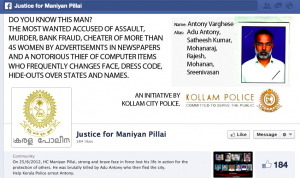Nikhil Narayanan pointed me to a fairly innovative use of social media by Kollam Police department. The Hindu has carried a piece about this effort too.
The idea is incredibly simple – take the ‘Wanted’ board in police stations to the social web – to Facebook, to be precise.
Interesting, huh?
While I really admire this nifty use of social media, and think that many other police stations may now follow suit on similar lines, the caveat I had stated earlier stays – .
Think about it – the ‘wanted’ board in the police station and posters offline can be removed or scrubbed off the face of the earth. Things online stay on forever… mostly.
That puts this effort in an uncomfortable position for 2 reasons – one, the accused is well, merely accused. He hasn’t been delivered justice yet – that is the duty of the court, not the police, I assume. So, can the police make him guilty by naming and shaming an ‘accused’ in the public space? You may ask – the offline posters and ‘wanted’ boards serve the same purpose – of course, but as I said, they can be removed and things do vanish from public memory after some time (just look at our politicians and their promises). Online?
Two, more importantly – you remember that tattoo on Amitabh’s hand, ‘Mera baap chor hai’, in Deewar? That kept reminding Amitabh and others around him that this boy is no good because of his father. Could such permanent online relics be the equivalent of that tattoo and not allow even someone who wants to reform to change? I suppose you could claim that such criminals do not deserve any benefit of doubt – but just remember, we’re hearing only the cops’ side of the story and the accused has not been given an opportunity to present his side yet. Sounds to lenient? But that’s how justice operates, right?
So why make something temporary permanent and tarnish the chances of some criminal turning over a new leaf completely? This Facebook page could be removed by Kollam Police in some time, but the shares and viral spread will remain online forever (in the sense that retrieval of such information is democratic and simple, unlike offline methods of publicizing such information).

